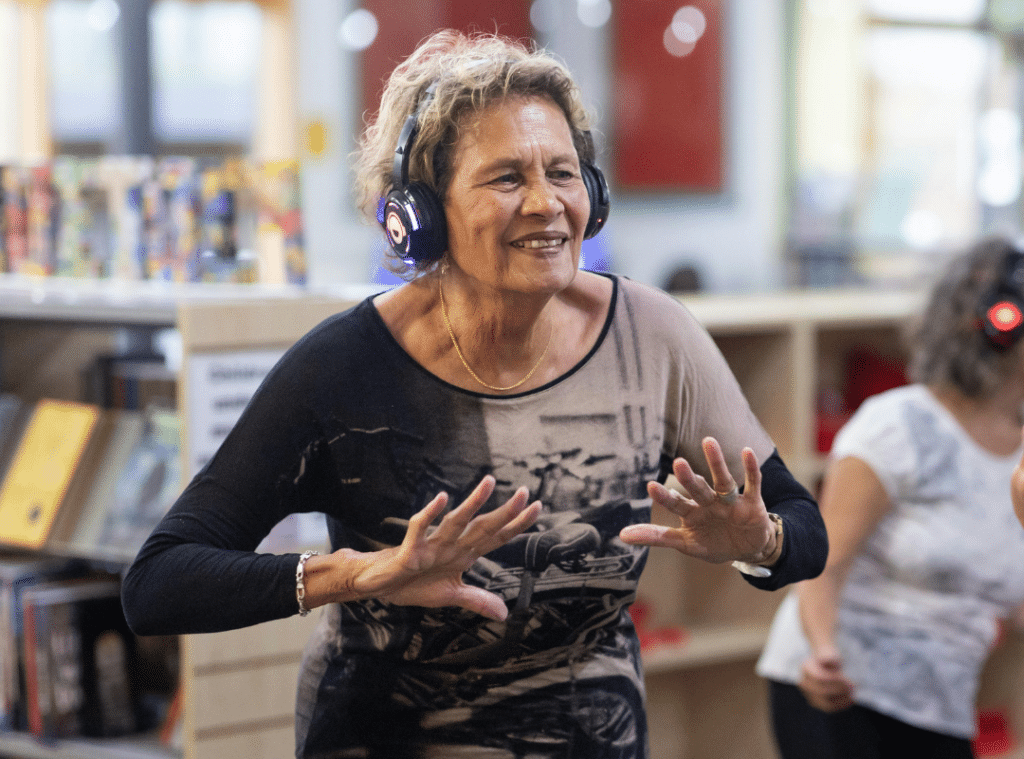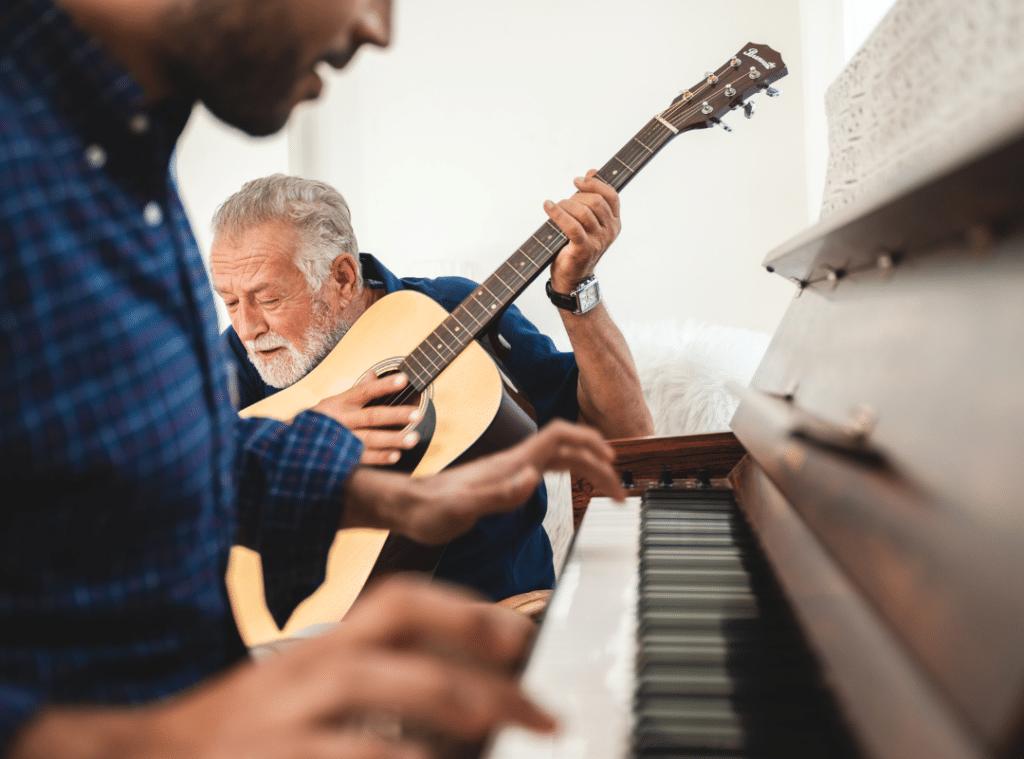Music holds a unique ability to connect, comfort, and uplift, especially for older adults. At Westmont Living, incorporating music for elderly people has become a key part of enriching residents’ lives. Whether through a casual sing-along or a therapeutic music session, songs have the power to rekindle precious memories, bring laughter, and build lasting bonds between residents and caregivers alike.
Music creates emotional bridges that span generations, from toe-tapping classics to tender ballads. It’s more than entertainment—music becomes a gateway to social interaction, cognitive stimulation, and personal growth. In this article, we’ll explore how integrating popular songs for seniors, including action songs for the elderly and funny songs for senior citizens, supports wellness and strengthens community. Let’s dive into how melodies are transforming elder care.
The Healing Rhythm of Music
The benefits of music therapy are vast, especially when it comes to promoting emotional well-being in seniors. Whether listening passively or actively engaging in song, music for elderly people can provide comfort, reduce anxiety, and improve overall mood. In nursing homes and assisted living communities, familiar melodies can ease transitions and even support cognitive functions.
Professionally guided music therapy can stimulate memory recall and enhance verbal expression, especially for seniors with dementia or Alzheimer’s disease. In fact, music enhances motivation during physical activity, making it an essential component of senior wellness programs.
Curating the Right Tunes: Sing-Alongs and More
Choosing the right music makes all the difference. Creating a sing-along songs for seniors list filled with nostalgic favorites like “You Are My Sunshine,” “Que Sera, Sera,” or “Sentimental Journey” can instantly spark joy. These songs often align with seniors’ formative years and are more likely to trigger positive emotional responses.
The key is variety—combine popular songs for seniors with lighthearted funny songs for senior citizens, such as “Hello Muddah, Hello Fadduh” to uplift moods and inspire laughter. When paired with hand motions or dance moves, action songs for elderly like “The Hokey Pokey” or “If You’re Happy and You Know It” encourage movement and boost physical coordination.
For a helpful starting point, consider this list of sing-along classics that are proven favorites in senior communities.
Music for Seniors in Nursing Homes
When it comes to music for seniors in nursing homes, personalized playlists and group activities have shown profound effects. Creating custom playlists with residents’ favorite artists or genres provides familiarity, reduces stress, and fosters a sense of control in unfamiliar environments.
Community-wide musical events or theme days centered around a particular decade (like the ’50s sock hop) help boost morale and spark resident interaction. These group experiences combat loneliness and enhance quality of life by promoting engagement.
Moreover, incorporating music into daily routines—such as morning wake-up tunes or relaxing evening lullabies—can help set structure and improve sleep patterns. According to the American Music Therapy Association, these strategies also support behavioral and psychological symptoms of dementia.

Using Music to Create a Social Community
At Westmont Living, music is woven into the fabric of daily life. From casual jam sessions to organized concerts, these moments foster meaningful relationships and nurture a sense of belonging. When seniors join together to sing or play instruments, it transforms the atmosphere into one of unity and celebration.
Here’s how music supports social connections:
- Promotes intergenerational interaction during visits or youth-led performances
- Encourages storytelling and shared experiences triggered by songs
- Builds teamwork during group musical games or choir practice
- Enhances empathy and emotional expression through lyrical content
Not only does this make daily life more joyful, but it also helps music for elderly people play a vital role in emotional and social resilience. Supportive communities with music programs have been shown to enhance mental health and well-being.
Growth and Enrichment Through Music
Engaging in music doesn’t stop at listening—learning and creating are equally important. Seniors often find joy and purpose in joining community choirs, learning basic percussion instruments, or even writing their own songs. This hands-on approach boosts confidence, supports memory retention, and sparks creativity.
Even small goals, like mastering a new verse or rhythm, can provide a sense of accomplishment. These musical outlets also improve cognitive function and hand-eye coordination. Whether it’s through sing-along songs for seniors list sessions or instrument-based classes, there’s always room to grow.
The role of music therapy in assisted living is an evidence-based way to improve well-being on emotional, physical, and cognitive levels.
Volunteer and Program Support
Looking for ways to make a difference? Many communities, including Westmont Living, welcome volunteers, donors, and partners to support music for seniors in nursing homes. Whether you’re musically inclined or just want to help organize, your contribution can leave a lasting impact.
Ways to support music initiatives for seniors include:
- Donating musical instruments or MP3 players for personalized playlists
- Hosting intergenerational concerts or holiday sing-alongs
- Volunteering as a song leader or accompanist for group activities
- Funding music therapy training for staff members
- Supporting access to online musical content and streaming services
Even the smallest gesture—like creating a sing-along songs for seniors list—can lead to heartfelt moments and emotional healing. Additionally, music is increasingly used to support memory care and emotional wellness, especially for seniors with cognitive conditions.
Transforming Lives One Melody at a Time
Music doesn’t just fill the room—it fills hearts. At Westmont Living, we’ve seen firsthand how music for elderly people builds joy, deepens relationships, and promotes emotional healing. From structured therapy sessions to spontaneous sing-alongs, music connects the past and present, turning ordinary days into meaningful experiences.
When residents participate in action songs for the elderly, chuckle at funny songs for senior citizens, or share a favorite tune from our sing-along songs for seniors list, something magical happens: they feel seen, heard, and loved. These shared musical moments are more than entertainment—they are catalysts for connection and well-being.
To learn more about how Westmont Living incorporates music into daily life and memory care programs, visit our website or call us at 858-456-1233. Whether you’re a caregiver, family member, or volunteer, there’s a way for everyone to bring the power of music into the lives of seniors.
Discover the level of care you or your family member requires.What Level of Care Do You Need?
Frequently Asked Questions
What music would an 80-year-old listen to?
An 80-year-old might enjoy music from the 1950s through the 1970s, including artists like Elvis Presley, Frank Sinatra, The Beatles, and Patsy Cline. This era’s music often brings back fond memories and emotional connections. Genres like rock and roll, jazz, swing, and early country are commonly favored. Personal taste can vary, so it’s helpful to ask about favorite artists or songs from their younger years.
What music do 90-year-olds like?
Many 90-year-olds enjoy big band, swing, classical, and early jazz music. Artists like Glenn Miller, Bing Crosby, Ella Fitzgerald, and Nat King Cole are often popular choices. This generation grew up with radio hits from the 1930s to the 1950s, which often carry deep nostalgic value. Familiar tunes from that era can be both comforting and uplifting.
What music calms the elderly?
Gentle instrumental music, classical pieces, and soft oldies are typically calming for elderly individuals. Nature sounds, piano melodies, and soothing hymns also promote relaxation and reduce anxiety. Music therapy often recommends familiar, slow-paced tunes that match the person’s preferences. Creating a calm musical environment can greatly enhance emotional well-being.
What music does an 85-year-old like?
An 85-year-old may enjoy music from the 1940s to the 1960s, including doo-wop, crooners, and early rock and roll. Artists like Doris Day, Johnny Cash, and The Everly Brothers are often well-received. This music often reflects the formative years of their life, making it emotionally resonant. Asking about favorite radio shows or dances from their youth can guide your music selection.








